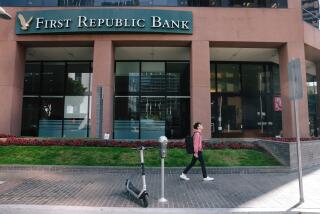Banks agree to participate in Greek bond exchange, debt buyback
- Share via
Banks pledged to participate in a bond exchange and debt buyback program as part of a new rescue package for Greece, as European leaders sought to halt the spread of the region’s sovereign debt crisis.
The banks’ participation will provide financing of 54 billion euros ($77.6 billion) to Greece from mid-2011 to mid- 2014, building to a total of 135 billion euros through the end of 2020, the Institute of International Finance said in a statement.
The plan followed weeks of discussions among banking officials in Rome, Paris and Berlin as well as meetings with European Union leaders during the emergency summit in Brussels yesterday. It’s part of a broader effort to draw a line under the escalating debt crisis that began with Greece and threatens to engulf Spain and Italy.
“This offer is part of a comprehensive package which involves a balance of interest for all parties,” said Josef Ackermann, the IIF’s chairman and chief executive officer of Frankfurt-based Deutsche Bank AG. “The private investor community will benefit from a more stable financial and economic environment.” The IIF’s members include more than 400 global banks and insurance companies, according to its website.
The participation of private investors, insisted upon by German Chancellor Angela Merkel and described by the IIF as “voluntary,” risks a temporary Greek default.
The official statement from European leaders after the summit said the Greek financing package will consist of 109 billion euros from the euro region and the International Monetary Fund in the 2011 to 2014 period. Financial institutions will contribute 50 billion euros after agreeing to the bond exchanges and buybacks that will also cut Greece’s debt load, the statement said.
The target participation rate by private investors is 90 percent, according to the IIF. As a result of the program, the average maturity of privately held Greek debt will extend from six years to 11 years. The stock of debt will be reduced by 13.5 billion euros through the bond exchange program, “and potentially much more through a debt buyback program that is to be defined by the official sector,” the IIF said.
In the debt exchange, “all instruments will be priced to produce a 21 percent net present value loss based on an assumed discount rate of 9 percent,” the IIF said.
Private investors will have the option to exchange existing Greek debt into four instruments. Three will be fully collateralized by AAA-rated zero-coupon securities and have a 30-year maturity, and the fourth will be for 15 years and partially collateralized by funds held in an escrow account.
The first option would be to swap existing securities into a 30-year par bond backed by top-rated debt purchased by the European Financial Stability Facility. The coupon would start at 4 percent and climb to 5 percent over the life of the bond, and the principal would be repaid to investors with the proceeds of the maturing zero-coupon securities.
In the second choice, investors would roll over their holdings into 30-year debt at par when the existing bonds mature, with the same collateral and interest rates as the first option. The other two options involve a “discount bond exchange” into 15- or 30-year securities, at 80 percent of par value.
The IIF assumes that an equal portion of investors will participate in each option.
European leaders, spurred into action by bond market turmoil during the past two weeks, empowered their 440-billion euro rescue fund to buy debt across stressed euro nations after eight hours of talks in Brussels. The fund can also aid troubled banks and offer credit-lines to repel speculators.
Leaders pledged a 160 billion-euro aid package for Greece, eased the terms of its existing loans and cajoled bondholders into footing part of the bill.
More to Read
Inside the business of entertainment
The Wide Shot brings you news, analysis and insights on everything from streaming wars to production — and what it all means for the future.
You may occasionally receive promotional content from the Los Angeles Times.








